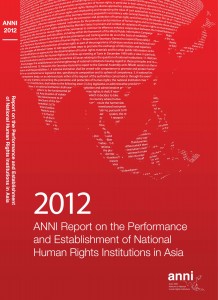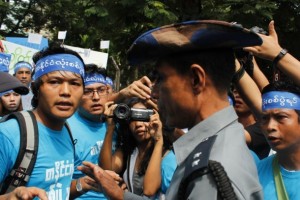Posts Tagged ‘Human Rights’ (685 found)
2012 ANNI Report on the Performance and Establishment of National Human Rights Institutions in Asia
 The past couple of years have seen an increasing international recognition of the role of NHRIs in the promotion and protection of human rights. A growing number of Asian countries have either recently established or are considering the establishment of NHRIs, including in Burma, where the Myanmar National Human Rights Commission (MNHRC) was set up in September 2011. Meanwhile the UN Human Rights Council on 16 June 2011 adopted a resolution on “National Institutions for the Promotion and Protection of Human Rights” – the first-ever Human Rights Council resolution to focus specifically on the work of NHRIs.
The past couple of years have seen an increasing international recognition of the role of NHRIs in the promotion and protection of human rights. A growing number of Asian countries have either recently established or are considering the establishment of NHRIs, including in Burma, where the Myanmar National Human Rights Commission (MNHRC) was set up in September 2011. Meanwhile the UN Human Rights Council on 16 June 2011 adopted a resolution on “National Institutions for the Promotion and Protection of Human Rights” – the first-ever Human Rights Council resolution to focus specifically on the work of NHRIs.
The resolution acknowledges the significant role of NHRIs in the promotion and protection of human rights at national level, as well as their important role in the Human Rights Council, and calls for further cooperation with regional coordinating bodies of NHRIs. These developments are set against the backdrop of a general deterioration in the situation of human rights in many countries in Asia. This can be seen, for example, in the adoption of various repressive laws such as national security laws […]
• • •Joint Statement on Humanitarian Assistance in Rakhine State, Burma
We appreciate the dilemma that this situation presents to donor governments and to humanitarian agencies, but we take the view that there is a humanitarian imperative to provide assistance without further delays. Anything that can be done to ameliorate the conditions in the Rohingya displacement camps must be done as a matter of urgency.
• •Women Bear Burden of Displacement in Palaung War Zones
“The Burden of War,” based on interviews with women in three IDP settlements in Manton and Namkham townships, describes the abuses that drove them from their homes, their perilous journey through the jungle and living conditions in the camps, where over 1,000 IDPs from fifteen villages are sheltering.
• • •Burma: Continued Use of Military-issued Instructions Denies Rights
Much has been made in recent times of the continued use in Burma of antiquated and anti-human rights laws from the country’s decades of military rule, as well as from the colonial era. While legislators discuss the amendment or revocation of some laws […]
• • •ASEAN: Postpone Deeply Flawed ASEAN Human Rights Declaration
The idea that all human rights are to be ‘balanced’ against individual responsibilities contradicts the very idea of human rights agreed upon in the 1948 Universal Declaration of Human Rights, which was affirmed by all States, including ASEAN Member States, in 1993 in the Vienna Declaration and Programme of Action,” said Wilder Tayler, Secretary General of the International Commission of Jurists.
• •Report on the Human Rights Situation in Burma (April – September 2012)
Over the period of this report, the political landscape in Burma has undergone noticeable shifts. Daw Aung San Suu Kyi, once a political prisoner under house arrest, recently returned from a whirlwind tour of the United States where she received […]
• • •Myanmar Urged to End Violence and Protect Vulnerable Communities in Rakhine State – UN Experts
“The Government has an obligation to protect all of those affected by recent violence, including the Muslim Rohingya community which is particularly vulnerable, to guarantee their safety and respond urgently to their needs, including shelter, food and medical care,” said the UN Independent Expert on minority issues, Rita Izsák. “It must act rapidly to ensure that this situation does not deteriorate leading to further loss of life and displacement of communities.”
• • •Keep Human Rights on the Agenda for Burma
 This week Tomás Ojea Quintana, the Special Rapporteur on the situation of human rights in Burma, presented his latest report to the United Nations General Assembly (UNGA) that will adopt, in a few weeks, its annual resolution on the situation of human rights in the country.
This week Tomás Ojea Quintana, the Special Rapporteur on the situation of human rights in Burma, presented his latest report to the United Nations General Assembly (UNGA) that will adopt, in a few weeks, its annual resolution on the situation of human rights in the country.
Since the lifting of sanctions and the renewal of diplomatic ties with the Burma government by many foreign countries, the UNGA resolution is one of the last tools remaining in the hands of the international community to encourage the government to turn the preliminary changes of the last year into more concrete democratic reforms.
Despite recent developments in Burma, the root causes of armed conflict still haven’t been addressed and human rights violations are ongoing, serious and prevalent throughout the country.
This week, the violence in Arakan State errupted again with more than a hundred victims in a week. Meanwhile, fighting in Kachin State continues and Mr. Quintana said in his press statement, “I have received allegations of attacks against civilian populations, extrajudicial killings, sexual violence, internal displacement, torture, forced labour and portering, as well as the ongoing use of landmines and the recruitment of child soldiers, by all parties to the conflict.” […]
• • •Report of the Special Rapporteur on the Situation of Human Rights in Myanmar
The mandate of the Special Rapporteur on the situation of human rights in Myanmar was established by the Commission on Human Rights in its resolution 1992/58 and extended most recently by the Human Rights Council in its resolution 19/21 […]
• • •UN Expert: Human Rights Should Lie at the Heart of Myanmar’s Reform Process
The United Nations Special Rapporteur on the human rights situation in Myanmar, Tomás Ojea Quintana, today highlighted the importance of keeping human rights on the agenda for Myanmar. This, he stressed, is particularly relevant in light of the ongoing violence in Rakhine State […]
• • •








 All posts
All posts